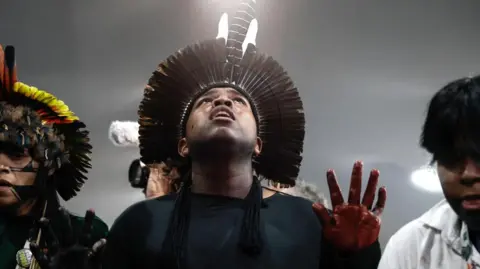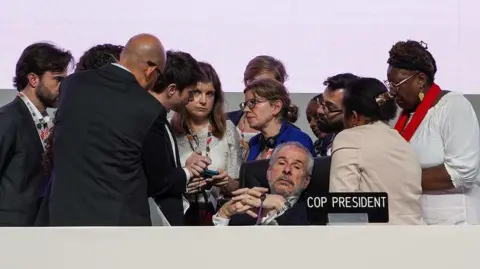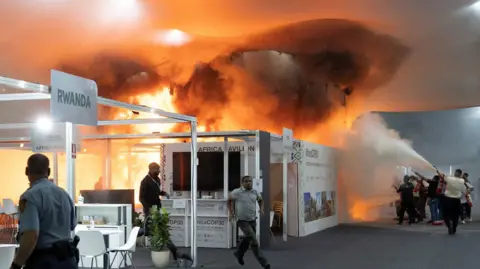Georgina RannardClimate and Science Correspondent, Belém, Brazil
 Environmental Protection Agency
Environmental Protection AgencyAfter bitter disputes, the UN COP30 climate summit in Belem, Brazil, ended with an agreement that makes no direct mention of fossil fuels that are warming the planet.
It is a disappointing end for more than 80 countries, including Britain and the EU, which wanted the meeting to commit the world to ending its use of oil, coal and gas at a faster pace.
But oil-producing countries have taken the line that they should be allowed to use their fossil fuel resources to grow their economies.
The meeting comes as the UN says it fears global efforts to limit global temperature rise to 1.5C above pre-industrial levels have failed.
Colombia's representative fiercely criticized the COP presidency for not allowing countries to object to the agreement at its final meeting on Saturday, known as the plenary.
“Colombia believes that we have sufficient scientific evidence that more than 75% of global greenhouse gas emissions come from fossil fuels,” Daniela Duran Gonzalez, Colombia's climate delegate, told BBC News.
“We therefore believe that it is time for the Climate Change Convention to start talking about this reality,” she added.
The final agreement, called Mutirao, calls on countries to “voluntarily” accelerate their actions to reduce their use of fossil fuels.
It was the first time the US did not send a delegation since President Donald Trump said the country would withdraw from the landmark Paris Treaty, which committed countries to action on climate change in 2015. He called climate change a “scam.”
Veteran negotiator and former German climate envoy Jennifer Morgan told the BBC the US absence was a “hole” in the talks. Often the US supported blocs such as the EU and the UK.
“During 12-hour negotiations overnight, with oil-producing countries pushing back hard and not having anyone pushing back, it was certainly difficult,” she said.
But for many countries, the fact that negotiations did not collapse and return to previous climate agreements is a relief.
Antigua and Barbuda Climate Ambassador Rouleta Thomas commented: “We are pleased that there is a process that continues to function. […] where every country can be heard.”
At the final meeting, the Saudi Arabian representative stated: “Each state should be allowed to chart its own path based on its respective circumstances and economics.”
Like many other leading oil-producing countries, the country argues it should be allowed to exploit its fossil fuel reserves, as others have done in the past.
 UNFCCC
UNFCCCThe two weeks of negotiations were chaotic at times. Toilets ran out of water, torrential thunderstorms flooded the venue, and delegates struggled to cope in the hot, humid conditions.
Some 50,000 registered COP delegates were evacuated twice. A group of about 150 protesters stormed the protest site, breaking security lines and carrying signs reading “Our forests are not for sale.”
There was a major fire on Thursday. burning a hole in the roof and forcing the participants to run outside.
Brazilian President Luiz Inacio Lula da Silva chose the city of Belém to draw world attention to the Amazon rainforest and attract an influx of finance to the city.
Despite pushing for a more ambitious fossil fuel deal, Brazil has been criticized for its own plans to extract oil from the Amazon estuary.
Offshore oil and gas production will continue to increase until the early 2030s, according to analysis provided to the BBC by Global Witness.
 Reuters
ReutersCountries involved in negotiations have competing interests, depending on their national circumstances and how exposed they are to the effects of climate change. Some countries were pleased with the results.
India praised the deal, calling it “significant”. A group representing the interests of 39 small island and low-lying coastal states on Saturday called it “imperfect” but still a step toward “progress.”
Poor countries have pledged to increase climate finance to help them adapt to the impacts of climate change.
“This got the ball rolling. There is a clearer recognition that those with historical responsibility [countries that emitted more planet-warming gases in the past] have specific responsibilities on climate finance,” said Sierra Leone’s Minister of Environment and Climate Change, Jivo Abdulai.
 Reuters
ReutersBut it's a sad end for more than 80 countries that had been negotiating overnight to keep tougher language on fossil fuels in the agreement.
UK Secretary of State for Energy and Climate Change Ed Miliband said the meeting was a “step forward”.
“I would prefer a more ambitious agreement,” he said.
“We are not going to hide the fact that we would prefer to have more, to have more ambition in everything,” EU climate commissioner Wopke Hoekstra told reporters.
With lush trees, bird calls and intense humidity, it was difficult to escape the Amazonian setting of the negotiations.
Brazil has begun negotiations with a new fund called the Tropical Forests Forever Facility, which will pay countries to protect tropical forests. By the end of the meeting, he had raised at least $6.5 billion from governments, although Britain had yet to contribute.
More than 90 countries have backed the call for a global action plan on deforestation, or road map.
Additional reporting by Tom Ingham, BBC Climate Team









